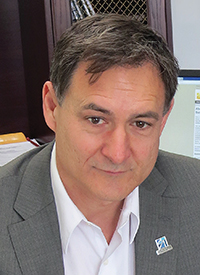“Perspectives on Sustainability in Illinois,” ISTC’s spring seminar series announced its next three events.
Noon- 1 p.m. Friday, Feb. 21 – “Beyond RFS and MPG: Promoting Cleaner Trucking Services” presented by Warren Lavey – Adjunct Professor in the Department of Natural Resources and Environmental Sciences as well as the School of Earth, Society, and Environment at the University of Illinois Urbana-Champaign and Senior Fellow at the Environmental Law and Policy Center, and Senior Regulatory Counsel at the American Clean Skies Foundation. At ISTC, 1 E. Hazelwood Dr., Champaign.
Technologies to cut truck emissions are available and cost-effective, and should be encouraged by a range of government and private actions. In 2013, Chicago approved the expansion of a railroad terminal contingent on retrofitting dozens of trucks with clean diesel filters. Illinois agencies are reforming freight and package delivery purchasing programs to implement the Transportation Sustainability Procurement Program Act of 2013. Similarly, the U.S. General Services Administration is applying new environmental preferences in selecting transportation vendors and tracking their performance.
This webinar will be broadcast live and also archived on our website www.istc.illinois.edu for later viewing. If you cannot attend the event at ISTC, you may view the webinar live by registering at: https://www4.gotomeeting.com/register/917343279.
Noon- 12:50 p.m. Monday, March 3 – “Under Pressure and in Hot Water: Algae Conversion to Fuels and Chemicals” presented by Phil Savage, Arthur F. Thurnau Professor, Department of Chemical Engineering, University of Michigan, Ann Arbor. At 3310 Newmark Civil Engineering Lab: a joint seminar between the Energy-Water-Environment Sustainability (EWES) Program seminar series in the Department of Civil and Environmental Engineering and the ISTC Sustainability Seminar Series.
Noon- 1 p.m. Friday, March 7 – “The Realities of Energy in Illinois and Beyond” presented by Tom Wolf, Executive Director, Energy Council, Illinois Chamber of Commerce. At ISTC, 1 E. Hazelwood Dr., Champaign.
Energy is used by everyone in the state of Illinois — we all rely on some form of energy or another as we live, work and play in a 21st century society. However, where does this energy come from? What are the challenges and opportunities associated with energy development and transportation? Are renewable energies really the answer? What’s next? Tom Wolf, the executive director of the Chamber’s Energy Council will give a high-level overview of energy issues in Illinois in an effort to ensure policy decisions are based on realty and not fantasy.
What do Illinois businesses think about hydraulic fracturing, energy conservation, climate change or exporting oil? This presentation will provide some insights as to the priorities for Illinois businesses when it comes to energy and where it might lead us in the coming years. Plus, it includes references to Princess Leia, Whack-a-Mole, and the 80’s rock icon, Meatloaf (Google him) — so it can’t be all bad, right?
This webinar will be broadcast live and also archived on our website www.istc.illinois.edu for later viewing. If you cannot attend the event at ISTC, you may view the webinar live by registering at: https://www4.gotomeeting.com/register/715828607.





